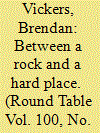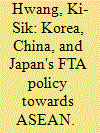| Srl | Item |
| 1 |
ID:
103861


|
|
|
|
|
| Publication |
2011.
|
| Summary/Abstract |
This article explores the role and effectiveness of small state trade diplomacy in the negotiations to conclude Economic Partnership Agreements (EPAs) between the European Union (EU) and the African, Caribbean and Pacific (ACP) group of countries, focusing specifically on the Southern African Development Community (SADC). Given the vast power asymmetries between the EU and the ACP, small states have had limited bargaining power to shape the process and the outcome of the negotiations. Unlike most other ACP EPA negotiations, the SADC small states were also caught between a rock (EU) and a hard place (South Africa), with both parties competing to promote their visions for regional integration. In the end, the EPA process split SADC into four sets of separate trade regimes with the EU, undermining the established regional integration project. The article explains this divisive outcome of the SADC EPA process by analysing the negotiation behaviour of the main parties, specifically the 'weaker' players. The article concludes with key lessons for small states' future trade negotiations.
|
|
|
|
|
|
|
|
|
|
|
|
|
|
|
|
| 2 |
ID:
167808


|
|
|
|
|
| Summary/Abstract |
Japan and the EU formally agreed on the outline of The Japan-EU Strategic Partnership Agreement (SPA) and the Economic Partnership Agreement (EPA) on 7 July 2017 and finalized on 17 July 2018. Despite such major shifts in the relationship between Japan and Europe, it is unfortunately true that Japanese society does not have a high level of interest in establishing a cooperative relationship or negotiating agreements such as the SPA with the EU, in fields other than economics. However, this low level of interest does not mean that strengthening a political relationship with the EU is unimportant. Rather, confirming that Japan and the EU share the basic values promoted by the SPA is even more important now than it was in 2011, when both leaders decided to initiate SPA and EPA negotiations. The international order—based on values such as liberty, democracy, the rule of law, human rights, the market economy, and free trade—which has been built up by Western countries, including Japan, since the end of the Second World War, is being challenged not only by emerging countries such as China but also by the Trump Administration in the United States. Japan-Europe relations after World War II have historically been dominated by economic friction, especially in the 1960s–1980s. But the experiences involved in resolving the economic friction enabled the relations to evolve from economic interests to the other area. There was a qualitative transformation of the relationship between Japan and Europe in the 1990s. This paper assesses the importance of cooperation with the EU for Japan in the twenty-first century.
|
|
|
|
|
|
|
|
|
|
|
|
|
|
|
|
| 3 |
ID:
100988


|
|
|
|
|
| Publication |
2010.
|
| Summary/Abstract |
This article analyzes Japan's motivations in opening negotiations on free trade agreements with Australia and Switzerland, highlighting intersections between domestic and international factors. While Australia is a security ally of Japan and a main source of natural resources, Switzerland is a traditional ally in World Trade Organization negotiations and considered a gateway to the European market.
|
|
|
|
|
|
|
|
|
|
|
|
|
|
|
|
| 4 |
ID:
098761


|
|
|
| 5 |
ID:
170513


|
|
|
|
|
| Summary/Abstract |
The recent proliferation of free-trade agreements drew the attention of the general public to their socio-economic effects on the local community. A common misunderstanding among the general public and firms is that, when an FTA is signed by their domestic government with a partner, the goods produced by their domestic firms will benefit automatically from preferential access to the partner’s market. However, this is not the case. This is where the rules of origin come into play. After reviewing the concept of the rules of origin, we will investigate them in the context of the EU–Japan relations, drawing on three cases: (i) the decision of Japanese firms to invest in Europe in the 1980s, (ii) the rules of origin in the EU–Japan Economic Partnership Agreement, and (iii) how the rules of origin between the UK and the EU following BREXIT could affect Japanese investment in Europe.
|
|
|
|
|
|
|
|
|
|
|
|
|
|
|
|
| 6 |
ID:
153334


|
|
|